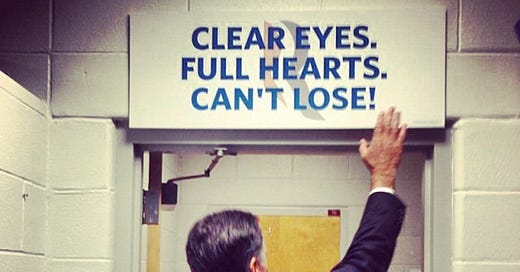'Losing would be such sweet sorrow': Mitt Romney hated the game
Inside the Book of Mitt reveals a tortured candidate who never seemed comfortable with the sport of politics until he was freed from playing it.
Only time allows us to forget Mitt Romney, The Villain.
The flip-flopping plutocrat with the car elevator installed in his beachside home and the family dog Seamus strapped to the top of his car.
You’d be forgiven for reveling in the caricature, since Mitt’s image was framed in comparison to Saint Obama – and during much simpler times, when the most urgent political debate was how best to distribute health insuranzzz.
2012 was perhaps the least consequential presidential election over the past three decades and the tempestuous years that followed left a considerable number of exasperated Americans thinking we would’ve been Just. Fine. With the first Mormon president.
In his current twilight form, with just 14 months left in his term before exiting the national stage, Romney’s reputation has been revamped. Again, mostly the result of the comparative politics of the MAGA era, but also, to his credit, Romney’s own declaration of conscience.
He is now Romney, The Rational.
The well-coifed pragmatic Senate dealmaker and principled anti-Trump truth-teller, unshackled from the constraints of political ambition to buck his party in the noble pursuit of preserving democracy. Or perhaps more cynically, because the long road of ambition has turned to dirt.
McKay Coppins’ new book, “Romney: A Reckoning” chronicles Mitt’s transformation in precise and engaging detail. Romney turned over his journals, emails and inner-most thoughts through 45 (!) interviews with Coppins, a fellow Latter-day Saint, providing him with an unvarnished view into Mitt’s head.
The result is a largely sympathetic portrait of a flawed, but essentially good man, awkwardly ambling toward the White House but not without deep doubts and crushing anxiety about how he was going about it.
For me, Coppins’ most enduring reveal isn’t Romney’s late day political transformation. It’s a more depressing or perhaps endearing divulgence: Romney hated politics.
Particularly when he stood at its apex.
Romney’s adviser, Stuart Stevens, liked to tell him that “the dirty little secret about politics is that most things don’t matter.”
But to Romney, everything mattered — and most of his career-defining 2012 campaign for the presidency was torturous.
Romney hated debate prep.
He hated Iowa, “the tar pit of American politics.”
He hated inserting easy applause lines into speeches like calling for the repeal of the “death tax.” (It was one of those things you say because you don’t know what you’re talking about,” he confided.)
He hated the Values Voters Summit,




